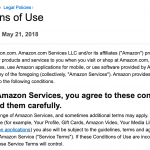
While Our Country Is Engulfed By Urgent Must-Solve Problems, Congress Is Working Hard to Burn Down Section 230
This post will be unusually blunt about my disenchantment with the state of our country, a topic I don’t normally discuss on the blog. Some of you will not like this post. I expect my next post will feel more…

Repeated Amazon Purchases Sufficient to Impute Notice of Arbitration Clause
We blogged Nicosia v. Amazon in 2015 and 2016. (See “The “Browsewrap”/”Clickwrap” Distinction Is Falling Apart”; “Anarchy Has Ensued In Courts’ Handling of Online Contract Formation (Round Up Post).”) A recent Second Circuit ruling in favor of Amazon, while unpublished,…
Print-on-Demand Vendor Doesn’t Qualify for DMCA Safe Harbor–Feingold v. RageOn
This case involves two copyright-protected photos that users submitted to the RageOn print-on-demand service. Among other defenses, RageOn invoked the DMCA safe harbor. The Greg Young v. Zazzle case held that Zazzle qualified for the 512(c) safe harbor for displaying…

Local Craigslist Ads Are Part of Interstate Commerce–US v. Luong
Luong advertised a used car on Craigslist’s San Francisco Bay Area site, in the “Dublin/Pleasanton/Livermore” subsection of the “East Bay” section. This area is sometimes called the Livermore Valley. From Livermore to the closest point in Nevada is about 200…
Supreme Court Promotes Weaponization of Generic Domain Names–USPTO v. Booking.com
The USPTO believed that “generic.com” domain names were almost always generic and therefore unregistrable. On that basis, it denied registration for Booking.com. The Supreme Court holds that generic.com domain names aren’t necessarily generic, which means they have the potential to…

Court Upholds Formation of a Lengthy Contract Presented on a Mobile Device–Hidalgo v. AAU
The plaintiffs are suing over a data breach. The defendant sought to invoke its arbitration clause in its membership agreement. The court finds the contract formed and sends the case to arbitration. The case involves the following screenshot as part…

Another Court Rejects Turo’s Eligibility for Section 230–Turo v. Los Angeles
As I previously blogged: Turo is a peer-to-peer marketplace for car rentals. “Colloquially put, Turo is the ‘Airbnb’ of private motor vehicles.” Though Turo doesn’t dictate where the buyer and seller exchange the car, Turo facilitates matches at airports, either…
Reviewing the Americans With Disabilities Act’s Application to Websites–Martinez v. SDCCU
Following the Ninth Circuit’s Robles v. Domino’s opinion, we’ve entered a period of relative clarity about when websites constitute “places of public accommodation” for purposes of the Americans With Disabilities Act (ADA). A recent court opinion, over a financial institution’s…

The CCPA Proposed Regs’ Data Valuation Calculation Provisions Provide Flexibility, But Raise Ambiguity & Transparency Concerns
by guest blogger Lourdes M. Turrecha, Privacy Tech & Law Fellow at Santa Clara Law [Eric’s Note: I am working on a mondo blog post about the AG’s final CCPA regulations. In the interim, I’m sharing this post from Lourdes…

Brokerage Account Formation Process Upheld–Valelly v. Merrill Lynch
The plaintiffs contend that their Merrill Lynch brokerage money was swept into unduly low-earning accounts. Among other things, they alleged breach of a quasi-contract, a claim that cannot work if there was an express contract. So, at issue in this…
